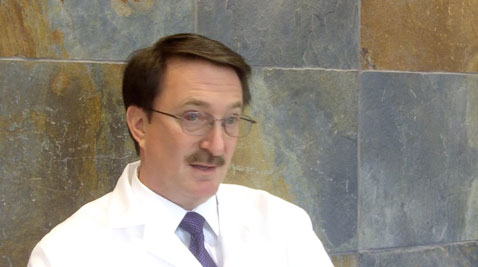BALTIMORE – The NFL has been under scrutiny for its handling of concussions in recent years, but fans remain loyal: On Thursday the Ravens take on the Pittsburgh Steelers in the first Thanksgiving Day installment of one of the league’s best rivalries.
Throughout their respective histories, both teams have been known for hard-hitting defense. In the 17 years of the Ravens’ existence, the two teams have combined for six Defensive Player of Year awards and six finishes as the NFL’s No. 1 defense in terms of points allowed. If two teams were to epitomize the aggressiveness and toughness of football it may just be the Ravens and Steelers.
But Pittsburgh is also the team that takes center stage in a recent PBS Frontline documentary called “League of Denial,” about the dangers of concussions.
Former Steelers center, Mike Webster, was the first NFL player to be diagnosed with a disease called chronic traumatic encephalopathy after his death in 2002. The disease is believed to have come from the repeated blows to the head Webster sustained throughout his football career. That same year, the University of Pittsburgh Medical Center developed the ImPACT baseline concussion test at the request of the Steelers’ front office.
“League of Denial” tells the story of doctors who contradicted the NFL’s laid-back attitude toward concussions, although their research was largely ignored by the league.
When the documentary aired, Dr. Kevin Crutchfield, the independent neurological consultant for the Baltimore Ravens, said he was not surprised by what he saw.
Crutchfield, who serves on the NFL Players Association’s concussion and traumatic brain injury committee and is a concussion expert with LifeBridge Health in Baltimore, said, “I’ve known about all that information for some time.”
Crutchfield said his position with the Ravens was created for all 32 NFL teams after the league went before Congress in 2009 and was compared to tobacco companies because of its denial of a serious health problem in its business.
Crutchfield emphasized that he is completely independent from the Ravens’ management, and doesn’t deal directly with any team staff except for the players who come to see him for an unbiased opinion on their head injuries.
According to Crutchfield, the creation of his role with the Ravens came shortly after the Congressional hearing. It was part of a series of quick changes in the NFL’s stance on concussions. The league began to acknowledge the connection between head injuries sustained in football and long-term neurological problems. It gave $1 million to Boston University’s chronic traumatic encephalopathy research, and offered to provide researchers with brains of deceased players.
“I think certainly the NFL has helped raise awareness about concussions in the last several years,” said Stacy Suskauer, the director of Brain Injury Rehabilitation Programs at the Kennedy Krieger Institute in Baltimore. “They are talking about it a lot more, and that helps parents and athletes be more aware.”
Others, like Amy Knappen, the program advisor of HeadFirst Sports Injury and Concussion Care located throughout Maryland, remain skeptical.
“I would say some of it is just reputation management right now on their part,” Knappen said. “I don’t know the sincerity.
“I think they’re frightened … we’re seeing the number of kids playing in rec-league football decline substantially … just in [Anne Arundel] County we’ve had reports of a 20 percent decline in kids wanting to play,” Knappen said.
Whether or not Crutchfield’s roles with the NFL started as reputation management in the league’s eyes, he feels he has gotten through to some players, saying he’s noticed a shift in attitudes since he began serving on the NFL Players Association’s concussion and traumatic brain injury committee in 2010.
“My first two years … the active players I would talk to would say to me ‘…Just give us the information, and we’ll make our own decisions,’” Crutchfield said. “Last year, there was an 180-degree turn and the players are now saying, ‘We now realize, the more we’re educated on this, that we don’t know enough to protect ourselves … you as the medical community need to step in and help protect us from ourselves.’”

